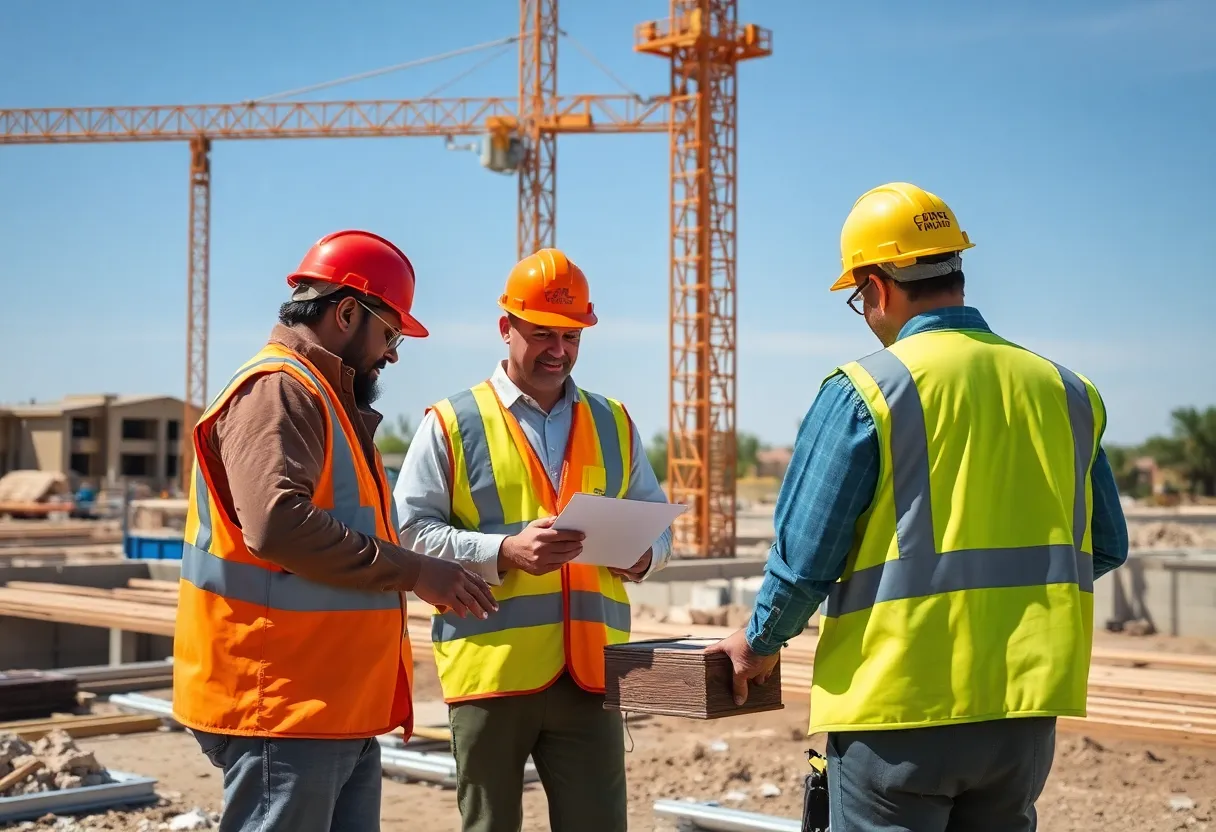What Are the Top Home Construction Mistakes to Avoid in Phoenix?
1. Hiring Unlicensed or Inexperienced Contractors
Choosing unlicensed or inexperienced contractors can pose serious risks to your project. Such professionals often lack comprehensive knowledge of local building codes, safety standards, and industry best practices. This can lead to substandard workmanship that fails to meet legal and safety requirements. Additionally, unlicensed contractors may not carry insurance, leaving you liable for potential damages or accidents. The result can be costly repairs, delays, and compromised safety of your new home. Always verify that your contractor holds valid licensure and insurance, and review their experience with similar projects in the Phoenix area.
Ensuring that the contractor has a proven track record minimizes the risk of mistakes that can haunt you long after construction is complete.
2. Using Low-Quality Materials
While opting for cheaper materials might seem to save money initially, it often leads to durability issues, aesthetic disappointments, and safety problems. Low-grade materials can deteriorate faster, requiring frequent repairs or replacements. They can also compromise structural integrity, especially in a desert climate like Phoenix where exposure to intense sun and temperature fluctuations is common. Spending on high-quality, weather-resistant materials ensures your home remains durable and requires less maintenance over time. Investing wisely in quality materials bolsters the home’s longevity and reduces long-term expenses.
3. Neglecting Proper Planning and Budgeting
Neglecting detailed planning and realistic budgeting fuels unexpected expenses and delays. Without thorough planning, you risk overlooking permit costs, material fluctuations, and unforeseen structural issues. Poor budgeting often leads to project halts before completion, creating frustration and financial strain. Collaborate with experienced architects and construction professionals to develop comprehensive designs and budgets. Explicitly include costs for permits, inspections, contingencies, and future upgrades. This strategic approach ensures that your Phoenix home construction stays on schedule and within financial boundaries.
4. Ignoring Structural and Foundation Issues
Overlooking foundational or structural problems can threaten the safety and stability of your home long-term. Phoenix’s expansive soil and temperature swings call for vigilant assessment during planning. Detecting issues early — such as soil settlement, inadequate footings, or cracks in existing structures — avoids catastrophic failures later. Engage licensed structural engineers for evaluations. Addressing concerns at the outset avoids costly repairs after construction, ensuring your home stands solid for years to come.
5. Overlooking Electrical and Plumbing Systems
Faulty electrical wiring or plumbing systems pose significant safety hazards, including fire risks and water damage. Poor design, substandard installation, or non-compliance with local codes can result in frequent repairs or dangerous failures. Always hire licensed electricians and plumbers with knowledge of Phoenix’s specific building codes. Proper planning includes adequate circuit capacity, surge protection, and efficient plumbing layouts to prevent leaks and ensure reliable operation.
Regular inspections during construction help catch issues early, preventing costly corrections later.
6. Skipping Professional Interior Design and Space Planning
Failing to consult interior design experts can result in cramped or inefficient living spaces. Effective space planning considers traffic flow, natural light, storage, and ergonomics. The Phoenix climate benefits from open layouts that enhance ventilation and indoor-outdoor connections. Professional designers optimize every square foot, balancing aesthetics with functionality. Well-planned interiors improve daily living comfort and enhance your home’s resale value.
7. Taking on Complex Remodeling Without Expert Help
Attempting large-scale remodels without expert guidance can lead to safety hazards, poor structural integrity, and financial wastage. Complex demolition, reinforcement, and systems upgrades demand skilled supervision. For high-end or intricate upgrades, hire specialists with proven experience. They ensure compliance with local regulations, proper material selection, and quality craftsmanship. Collaborating with professionals mitigates risks associated with complex projects in a competitive Phoenix market.
8. Poor Communication with Your Contractor
Effective communication is essential for project success. Misunderstandings can cause delays, increased costs, and dissatisfaction. Establish clear channels for updates, questions, and approvals at the outset. Regular meetings maintain alignment on progress, changes, and issues. Use written documentation for scope adjustments and decisions. Transparent communication fosters trust, reduces errors, and ensures your vision is accurately realized.
9. Skipping Quality Checks During the Project
Failure to conduct consistent inspections can multiply small issues into costly repairs. Rushing through stages without verification may allow defects to go unnoticed. Conduct thorough quality checks at each phase— framing, electrical, plumbing, finishes—before moving forward. Addressing problems early prevents rework, delays, and cost overruns. Routine oversight promotes adherence to standards and guarantees that the project meets your expectations.
10. Choosing the Wrong Contractor for Specialized Projects
Not all contractors possess expertise across all home construction specialties. Selecting an unsuitable team can lead to poor workmanship and safety hazards, particularly for custom features like energy systems, smart home integrations, or luxury finishes. Verify contractors’ experience explicitly related to your project’s scope. Proper specialization enhances quality, compliance, and durability of specialized systems.
11. Underestimating the Project Scope
Under-scoping a project leads to unrealistic timelines, change orders, and budget overruns. Detailed, comprehensive scopes clarify each trade’s responsibilities, materials, and timelines. Early involvement of subcontractors ensures precise estimates and coordination. Avoid assumptions by thoroughly evaluating every aspect—from foundation to finishing—to prevent surprises during construction. Proper scope management guarantees smooth project progression and high-quality results.
12. Not Getting Proper Approvals and Permits
Bypassing permits and approvals invites expensive delays and penalties. Local regulations in Phoenix mandate clear compliance, especially for structural, electrical, and plumbing work. Ensure all plans are reviewed and approved by the appropriate agencies before breaking ground. Proper documentation not only avoids legal consequences but also facilitates inspections, ensuring your home adheres to safety standards and code requirements.
13. Overlooking Ventilation and Natural Light
Neglecting fresh air and daylight impacts indoor air quality and livability. Dark, poorly ventilated spaces foster humidity, mold, and discomfort. Incorporate large windows, skylights, and open floor plans to maximize natural light. Ventilation options like operable windows, attic vents, and air exchanges promote healthier environments. In Phoenix’s climate, daylight and airflow reduce dependence on energy-intensive cooling and lighting systems.
14. Inadequate Electrical and Plumbing Planning
Poorly structured electrical and plumbing systems can cause inconvenience and costly future modifications. Designing these systems with future needs in mind is critical. Allocate sufficient electrical outlets, circuits for appliances, and plumbing fixtures in logical locations. Support systems with backup plans for capacity and safety. Proper planning ingrains reliability and scalability, ensuring your home functions seamlessly in the long term.
15. Rushing the Construction Timeline
Accelerated schedules often sacrifice quality for speed, leading to omissions and errors. Realistic timelines accommodate unforeseen delays, supply chain issues, and inspection periods. Prioritize sequencing steps efficiently and avoid skipping critical quality checks. Patience during construction translates into a more polished home capable of enduring the test of time.
16. Not Planning for Storage and Utility Areas
An organized home relies on adequate storage. Overlooking closet space, pantries, and utility rooms results in cluttered, inefficient living. Allocate practical areas for HVAC units, electrical panels, and emergency systems. Well-designed storage solutions improve daily comfort and streamline maintenance tasks. Utility spaces should be accessible yet unobtrusive, contributing to overall home function.
17. Not Thinking About HVAC System Requirements
HVAC systems directly influence comfort, energy costs, and air quality. Early in design, evaluate cooling, heating, and ventilation needs specific to Phoenix’s climate. Proper duct placement, insulation, and zoning optimize system efficiency. Neglecting these considerations can cause uneven temperatures, high utility bills, and indoor air issues.
18. Not Getting a Home Inspection Before Closing on the Property
Inspection before project initiation identifies existing issues such as structural damage, pest problems, or plumbing leaks. Detecting these early influences project scope and costs. An overlooked defect can escalate if not addressed beforehand, complicating the building process and increasing expenses. These assessments safeguard your investment from unresolved underlying problems.
19. Not Having Sketches/Blueprints Ready Beforehand
Starting construction without detailed drawings risks design inaccuracies and costly modifications. Precise blueprints clarify dimensions, materials, and systems integration. They also facilitate permits and contractor bidding. Clear plans prevent miscommunications and allow smoother project execution, saving time and money.
20. Not Paying Close Attention When Designing Spaces
Designing multi-story homes demands careful planning of logistics, storage, and compliance. Room sizes, ceiling heights, and spatial relationships impact usability. Consider future needs for expansion or accessibility. Proper planning ensures functional, comfortable, and regulation-compliant spaces for all household members.
21. Not Choosing the Right Builder Carefully
The reputation, experience, and financial stability of your builder influence project quality. Conduct thorough reviews, check references, and assess their portfolio. Price should be balanced with craftsmanship and professionalism. Selecting a reputable builder reduces the likelihood of disputes, delays, and poor workmanship.
22. Not Properly Disposing of Debris
Construction debris poses health, environmental, and legal hazards if improperly disposed. Implement waste management plans, working with certified disposal firms. Recycling and responsible dumping lessen environmental impact and avoid fines. Clean job sites foster a safer working environment and support community standards.
23. Prioritizing Design Aesthetics Over Function
While aesthetics appeal visually, neglecting functionality results in inconvenient spaces. Evaluate how each area will be used daily. Balance design elements with practical considerations like traffic flow, storage, and maintenance. Efficient, beautiful homes enhance quality of life and retain value longer.
24. Not Thinking About Soil Testing
Soil quality directly influences foundation integrity and drainage. Conduct comprehensive soil analysis before specifying foundation types. In Phoenix, expansive clay soils are common; proper testing helps tailor foundation solutions to prevent future cracking or sinking. Investing in this assessment avoids extensive repairs later.
25. Not Thinking About Energy Efficiency and Sustainable Design Opportunities
Energy-efficient features reduce ongoing costs and environmental impact. Incorporate insulation, solar options, energy-efficient windows, and smart systems. Sustainable choices increase home value and comfort. Ignoring these opportunities may lead to higher utility bills and a heightened ecological footprint.
26. Over-Customizing at the Expense of Practicality and Resale
Highly personalized features may compromise everyday functionality and limit future resale appeal. Ensure custom options maintain a good balance between individual preferences and marketability. Flexible designs accommodate changing needs and enhance long-term investment returns.
27. Not Thinking About Natural Light and Ventilation
Natural light enhances ambiance and reduces reliance on artificial lighting. Proper ventilation maintains air quality and moisture control. Strategically position windows, vents, and open spaces during design. This focus supports health, comfort, and energy efficiency, especially in Phoenix’s dry climate.
28. Not Thinking About Waterproofing and Insulation
Effective waterproofing prevents water infiltration, mold growth, and structural deterioration. Proper insulation reduces energy consumption, maintaining comfortable indoor temperatures. Use high-quality materials in roof, walls, and foundations to protect against extreme heat and monsoon moisture.
Frequently Asked Questions
What is the most common mistake in home construction in Phoenix?
One of the most common errors is hiring unlicensed or inexperienced contractors, which can compromise quality, safety, and compliance with local codes.
Why is proper planning crucial before starting construction?
Proper planning ensures realistic budgets, accurate timelines, permits compliance, and prevents costly rework or unforeseen delays during the build.
How can I ensure my home has sufficient natural light and ventilation?
Strategically place large windows, skylights, and open layouts to maximize daylight. Incorporate cross-ventilation features such as operable windows and vents for fresh air circulation.
What should I consider for future-proofing my home?
Incorporate energy-efficient systems, sustainable materials, adaptable spaces, and robust foundation and structural elements to ensure longevity and adaptability for future needs.
Key Features of Top Home Construction Mistakes to Avoid in Phoenix
| Category | Critical Mistakes to Watch For | Best Practices |
|---|---|---|
| Contractor Selection | Unlicensed or inexperienced professionals | Verify licenses, review references, and assess experience |
| Materials | Low-quality, substandard materials | Invest in durable, climate-appropriate products |
| Planning | Insufficient scope and budget estimates | Detailed designs, realistic timelines, and contingency funds |
| Structural & Systems | Foundation, electrical, plumbing issues | Early assessments and professional installations |
| Design & Layout | Poor interior planning, underestimated natural lighting | Commission interior designers and optimize natural features |
Relentlessly addressing these key points ensures a construction process that minimizes errors, adheres to safety standards, and results in a durable, functional, and delightful Phoenix home.
Author: STAFF HERE PHOENIX WRITER
The PHOENIX STAFF WRITER represents the experienced team at HEREPhoenix.com, your go-to source for actionable local news and information in Phoenix, Maricopa County, and beyond. Specializing in "news you can use," we cover essential topics like product reviews for personal and business needs, local business directories, politics, real estate trends, neighborhood insights, and state news affecting the area—with deep expertise drawn from years of dedicated reporting and strong community input, including local press releases and business updates. We deliver top reporting on high-value events such as the Waste Management Phoenix Open, Cactus League Spring Training, and Arizona State Fair. Our coverage extends to key organizations like the Greater Phoenix Chamber of Commerce and Visit Phoenix, plus leading businesses in technology and healthcare that power the local economy such as Intel and Banner Health. As part of the broader HERE network, including HERETucson.com, we provide comprehensive, credible insights into Arizona's dynamic landscape.





